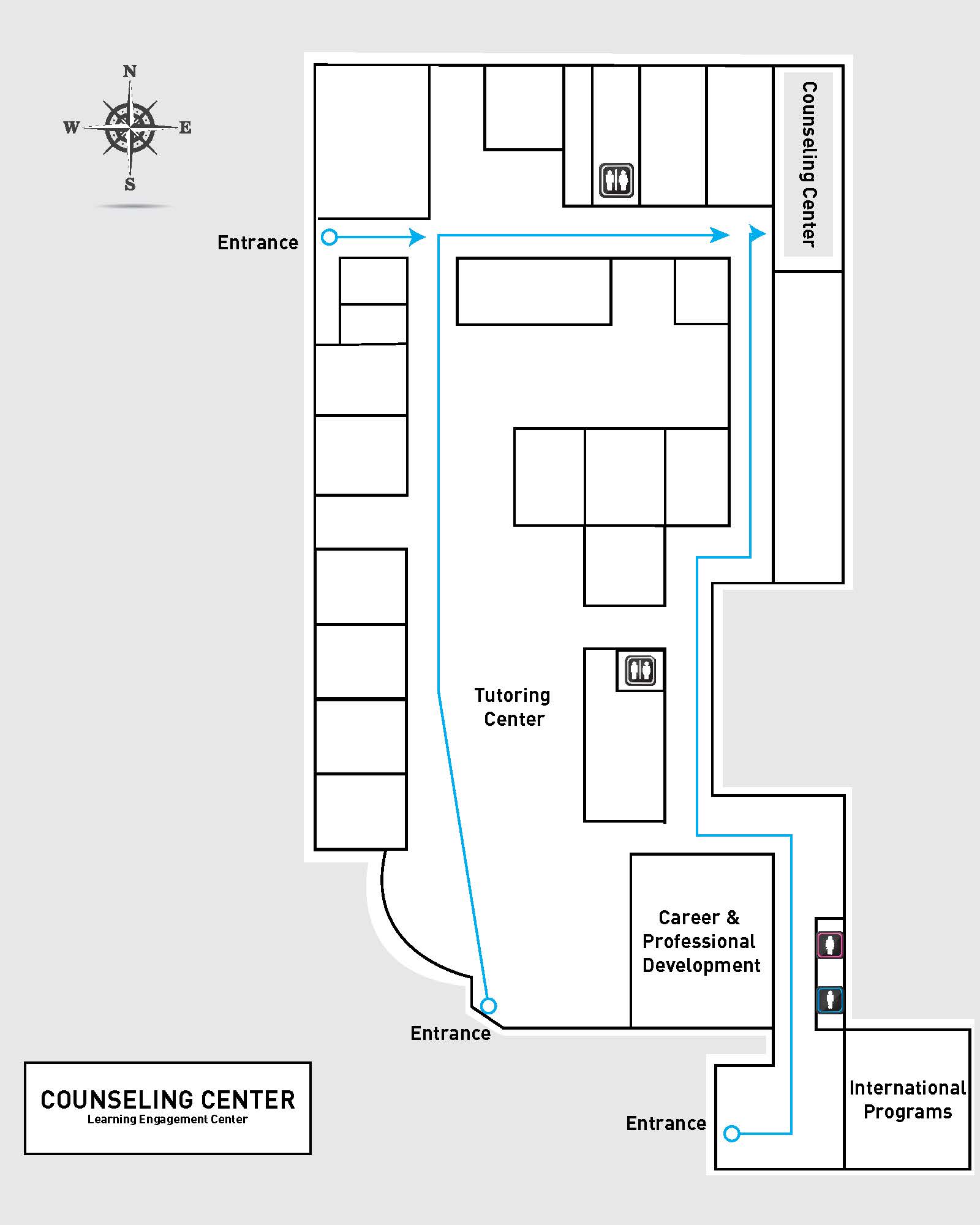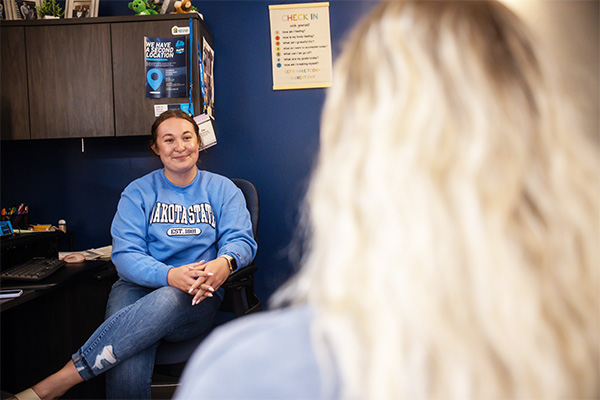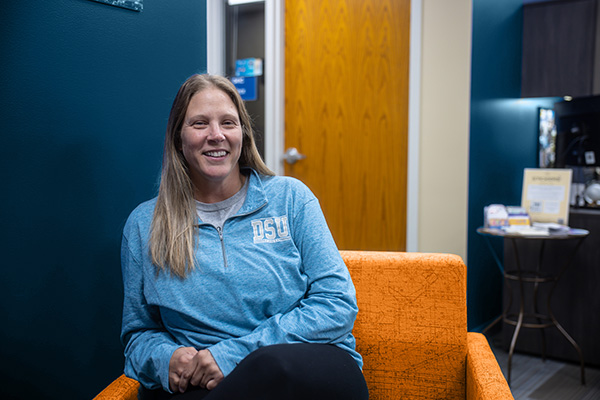Disability Services
At Dakota State University, we have a dedicated Disability Services Coordinator who works one-on-one with students to coordinate appropriate accommodations and promote a positive learning environment.
From ensuring physical accessibility across campus to supporting students with learning differences, our office serves as a vital resource for the DSU community. We have a dedicated Disability Services Coordinator who works one-on-one with students to coordinate appropriate accommodations and promote a positive learning environment.

First Time Accommodations
If you are requesting accommodations for the first time, please complete the Public Request Form and attach supporting documentation.
Academic accommodations
Students are responsible for making appropriate disclosure(s) in a timely manner to request Disability Services for accommodations.
To explore and seek academic or nonacademic (housing, dining, parking, emotional support animal, etc.) accommodations, students follow the outlined process below.
Steps to accommodation
If you are new to our office or a new student at Dakota State University, please complete the Public Request Form and attach supporting documentation.
This will help us get to know your needs and start the accommodation process. We must have documentation before processing your request. If you have any questions, please email DSU-ADA@dsu.edu.Documentation must be recent (within the last three years) and should include a medical or psychological evaluation, or recent 504 or IEP paperwork, that describes the disability and any relevant limitations.
Qualified providers may include:
- Physicians
- Psychologists or Psychiatrists
- Other licensed healthcare professionals
All documentation must:
- Be on professional letterhead
- Include a diagnosis/disability for which the accommodation is being requested
- It must include recommendations for accommodations relevant to the diagnosis/disability and to higher education
- Disability is defined as one who: (i) has a physical or mental impairment that substantially limits one or more major life activities, or (ii) has a history or record of such an impairment, or (iii) is perceived by others as having such an impairment
After your request and documentation are received, a staff member may follow up with additional questions or request clarification. This step helps ensure we understand your individual needs and can provide appropriate support.
After review, DSU Disability Services will approve or deny the requested accommodations. Communication will be sent through Accommodate, and students will be required to sign the approved accommodations.
Before each new semester begins, students must log in to Accommodate and request their accommodations in each enrolled course. Students do not need to resubmit documentation unless there is a new diagnosis or updated information.
Students are responsible for initiating a conversation with each instructor about how their accommodations will be implemented. These discussions ensure accommodations are appropriately arranged for each course.
For example, if a student is approved for extended testing time in a distraction reduced- environment, they and the instructor should decide together how and where exams will be administered.
We want to give everyone the opportunity to learn, but we know that people learn in different ways. Reasonable accommodations vary from student to student and may include—but are not limited to—the following:
- Permission to record lectures
- Access to note-taking technology and readers
- Extended time for testing
- Audiobooks
- A quiet test area
- Lecture notes provided by the instructor
- Interpreter services
- Use of formula and fact sheets
- Use of dictation software for in-class writing assignments and essays
We'll work with you to find a solution that will help you succeed.
Non-academic accommodations
Priority Deadline Dates
- June 21 for Fall Semester
- December 3 for Spring Semester
While applications submitted after these dates will be accepted and considered, we cannot guarantee that DSU Residence Life will be able to meet late applicants’ accommodation needs.
Please note that although DSU Disability Services may support a student’s request for housing accommodation, assignment is dependent upon Residence Life’s room availability. Therefore, students may be placed on a waitlist.
DSU Disability Services evaluates requests for Emotional Support Animals (ESA) in Dakota State University owned housing. Approval requires that a student must have an impairment that rises to the level of a disability in that it substantially limits one or more major life activities, and documentation stating the presence of an ESA will have therapeutic benefit in alleviating one or more of the identified effects of the disability.
We accept documentation from a licensed provider who has personal knowledge of the student through a professional relationship involving the provision of disability related services and who are practicing within their ethical, legal, and professional obligations.
To consider requests for ESAs, students must complete the Emotional Support Animal Form and provide written documentation from a provider that includes all details stated on the form. These documents should be submitted to DSU Disability Services through the Public Request Form.
Meal Plan Exemption Process
Per South Dakota Board of Regents (BOR Policy 3:6.1a), students are required to live and dine on campus for their first two years after high school. All students living in DSU residence halls must participate in a university meal plan.
DSU Dining Services offers a variety of options to meet dietary needs. If your documented medical or religious dietary requirements cannot be met, you may request a meal plan exemption.
To request an exemption:
- Complete the Public Request Form and submit the appropriate exemption form:
- For medical requests, submit the Meal Plan Exemption Form
- For religious requests, submit the Religious Meal Plan Exemption
(Both forms are submitted through the Public Request Form.)
- Meet with Sodexo Dietitian, Eric Finley, who will review your request and provide recommendations.
Exemptions are granted only when Dining Services cannot meet a student’s documented nutritional needs. Students are responsible for submitting all materials and obtaining approvals by the deadlines. Incomplete requests will not be considered.
Deadlines:
- Fall Semester: Friday following the first day of classes
- Spring Semester: Friday following the first day of classes
Important Information
Exemptions will not be approved for dietary preference (e.g., vegan/vegetarian), work/class/practice schedules, or other personal reasons.
Medical documentation must come from an MD, DO, NP, or ND (not chiropractors or herbalists).
If approved, meal plan charges will be prorated from the approval date; prior charges remain valid.
Incomplete or late submissions may cause delays or denial.
- Medical requests: complete the Meal Plan Exemption Form
- Religious requests: complete the Religious Meal Plan Exemption
- Requests received after the deadline will be reviewed for the next semester, unless a new condition arises.
Students must reapply each year with documentation dated within six months. Keep copies of your records.
If meal plan charges are already on your account, you must pay by the deadline; approved exemptions will result in a pro-rated refund.
Appeals must be submitted within five business days to:
Amy Crissinger, Vice President for Student Affairs
Heston Hall, Madison, SD 57042
amy.crissinger@dsu.edu
Providing false information violates the Student Code of Conduct and may result in disciplinary action.
Meal Plan Exemption/Accommodation FAQ
Q: I moved off campus—do I still need a meal plan?
A: No exemption is needed. You may choose a commuter plan (flex dollars only) or opt out entirely.
Q: The deadline to change meal plans has passed. Can I submit an exemption to switch plans?
A: No. Meal plan changes are allowed 30–45 days before the semester starts and for about two weeks after classes begin.
Q: I’m withdrawing, transferring, or not returning next semester. What happens to my meal plan?
A: No exemption is required. Unused fall meal plan funds will not be refunded if you don’t return for spring.
Q: I have a dietary condition and want to reduce or waive my meal plan. What do I do?
A: Submit the Meal Plan Exemption/Accommodation Form with medical documentation from a doctor, allergy clinic, or registered dietitian showing medical necessity.
Q: My religious beliefs limit my dining options. Do I need to file a request?
A: Yes. Submit the exemption/accommodation form with a statement explaining your sincerely held religious dietary restrictions and contact information for your religious leader. Religious Meal Plan Exemption
Students who need help with parking due to a disability or other unique circumstances may be eligible for ADA accommodations on campus. These accommodations are designed to make sure that anyone with mobility challenges, medical needs, or similar concerns can get around campus more easily and take part in campus life without added stress.
If you already have a state-issued accessibility placard and a valid DSU parking permit, you’re all set to use accessible parking spaces. If you have any questions, feel free to email parking@dsu.edu.
If you do not have a state-issued accessibility placard, you can request parking accommodations by completing the Public Request Form and attaching supporting documentation.
Note: All employees and students must have a valid DSU Parking Permit, even if they have a state-issued accessibility placard.
How is this different from high school accommodations?
| High School | College | |
|---|---|---|
| Applicable Laws |
I.D.E.A. (Individuals with Disabilities Education Act); Section 504, Rehabilitation Act of 1973; I.D.E.A. is about SUCCESS |
A.D.A. (Americans with Disabilities Act of 1990); Section 504, Rehabilitation Act of 1973; A.D.A. is about ACCESS |
| Identification | Student is identified by the school and is supported by parents and teachers | Student must self-identify to Disability Services if accommodations are wanted |
| Advocacy | Primary responsibility for arranging accommodations belongs to the school; Teachers approach you if they believe you need assistance | Primary responsibility for self-advocacy and arranging accommodations belongs to the student; Student is responsible for initiating contact with instructors and disability services |
| Parental Rights | Parent has access to student records and can participate in the accommodation process; Parent advocates for student | Parent does not have access to student records without student’s written consent; Student advocates for self |
| Planning | School must develop formal plan, and it is school’s responsibility to track student academic progress | Students must ask for services EACH semester, and are responsible for much of the accommodation process (i.e., scheduling tests, requesting accommodations for each class that accommodations are needed, etc.) |
| Instructor Involvement | Each teacher is aware of a student’s IEP and/or 504 Plan usually before the student begins class and has a good idea what the student’s academic needs are; IEP and/or 504 Plans are usually set in place at the start of every school year for identified students | Student must initiate all communication regarding utilization of accommodations with each professor for each course accommodations are requested every semester; Students may request accommodations at any time during the semester/term |
| Curriculum Modification | Teachers may modify curriculum and/or alter pace of assignments | Professors are not required to modify curriculum |
| Test/Exam Changes | I.E.P. or 504 plan may include modifications to test format and/or grading | Grading and test content changes are not required |
Make an Appointment

DSU Disability Services is located within the Counseling Center
Learning Engagement Center 041 - located in the northeast corner
Schedule an appointment through TrojanConnect by clicking on 'Counseling and Disability Services’, then ‘Disability Services/Accommodations’.
We value your privacy
The Americans with Disabilities Act and Section 504 of the Rehabilitation Act are very clear on privacy issues. Disability related information is to be treated with strict confidentiality, and we take this very seriously at DSU. This is important for individuals who may wish to access their right to accommodation while minimizing the risk of stigma sometimes associated with disability.
Americans with Disabilities Compliance Act Policy 8.7
Do you still have questions? Contact DSU-ADA@dsu.edu


